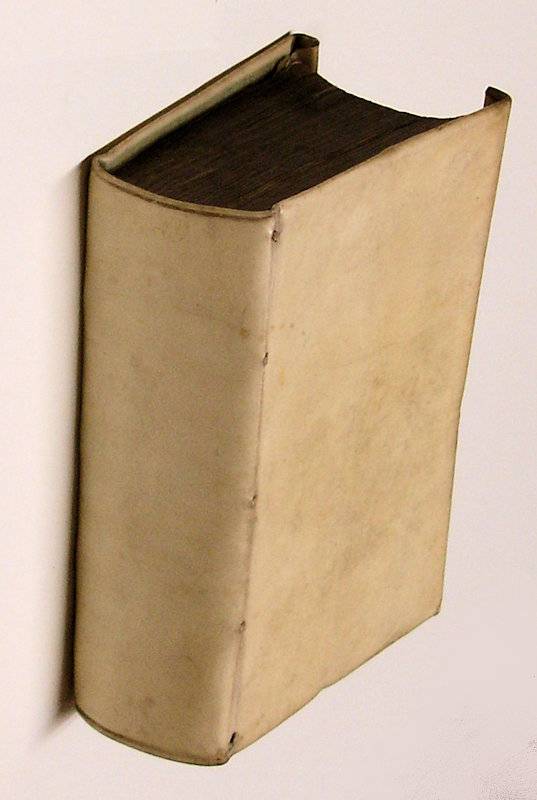HOMERUS.
Homeri Odyssea. Cum interpretatione lat. ad verbum, post alias omnes editiones repurgata plurimis erroribus, (& quidem crassis alicubi) partim ab Henr. Stephano, partim ab aliis. Adjecti sunt etiam Homerici Centones qui Graece HOMÊPOKENTPA: item, proverbialium Homeri versuum libellus. Editio postrema diligenter recognita per I.T.P.
Amsterdam (Amstelredami), Sumptibus Henrici Laurent, Bibliopolae, 1648.
8vo. 803,(1),67,(41 index) p. Contemporary overlapping vellum 16 cm (
Ref: Schweiger 1,158; Hoffmann 2,318; Graesse 3,328; Ebert 9968; cf Dibdin 2,51/52 for the Stephanus edition on 1588; Brunet 3,272) (
Details: 5 thongs laced through the joints. Woodcut printer's mark on the title, depicting a gardener, who is removing with his pruning knife dead, bad and otherwise harmful wood. The motto is: 'Non odit tamen', 'Even so he does not hate the tree'. Greek text with facing Latin translation. At the end, before the index 67 pages filled with 'Homeric centones') (
Condition: Vellum age-tanned. Edges of both pastedowns worn. A small and faint waterstain at the right upper corner of the last third of the leaves. Paper slightly yellowing) (
Note: This is part two only, the Odyssey part, of a two volume set of the 'Homeri Opera, cum interpretatione latina' (...) Editio postrema diligenter recognita per' one 'I.T.P.' published by Laurentius in 1648. This 1648 edition is a reissue of a Parisian edition of 1622/24: 'Homeri poemata duo Ilias et Odyssea sive Ulyssea. Alia item carmina eiusdem (...) Cum interpretatione lat. Accedunt Homerici centones et proverbialium Homeri versuum libellus. Editio postrema, diligenter recognita par I.T.P.'. Who this I.T.P. or J.T.P. was, no bibliographer has found out so far. What his editorial contribution was no one knows, and has not yet been investigated. He is possibly a Frenchman. All bibliographers agree that this Parisian edition was a repetition of still an earlier 2 volume edition, which came from the presses of the famous French scholar and printer Henricus Stephanus the Second in 1588: 'Homeri Ilias et Odyssea, alia item carmina eiusdem, cum interpretatione latina, repurgata plurimis erroribus, partim ab Henrico Stephano. Adiecti Homeric centones, item proverbialium versuum libellus'. The Latin translation of Homer was made by the Cretan Greek scholar Franciscus Portus, 1511-1581. He taught Greek at Ferrara, and had to leave for Geneva in 1559, owing to his sympathy with the cause of Reformation. Dibdin notes that his translation was 'not remarkable for its accuracy'. For the good things in the Greek text the credits were given to Henry Estienne, or in Latin Henricus Stephanus, 1531-1598. 'He will always be numbered among the principal editors of Homer', Dibdin concludes. For the weaknesses in the text it is explained that the great scholar was at the time absent from the office/printshop, and that part of it was printed without his superintendence. The Stephanus text of Homer became a kind of standard text in the Netherlands and in Britain. There was another 2 volume reissue published in Amsterdam by Ravestein (1650). This 1648 Odyssey edition on offer further contains the 'Batrachomyomachia', and the 'Homeric hymns', but also the so-called 'Homeric centones', a work composed in late antiquity. These centones, derived from the Greek 'kentron', 'needle', form 'patchwork poetry', and consist of complete or half Homeric hexameters. Knit together they create a new narrative of the Bible, especially the Gospels, in the august epic style of the ancients. They were first printed in 1504 by Aldus. The genre flourished in late antiquity, and there was a revival during the Renaissance) (
Provenance: A small coat of arms measuring 1.5 cm, has been blind stamped in the front flylaef, it consists of a shield divided into 4 fields; in the right upper and left lower field there is a standing cross, in the left upper field what seem 2 crossed swords, right lower field seems empty. Upon the shield rests a crown with seven points) (
Collation: A-3L8) (Photographs on request)
Book number: 120082 Euro 575.00
Keywords: (Oude Druk), (Rare Books), Greek literature, Griechische Literatur, Homer, Homerus, Odyssea, Odyssey, Stephanus, antike altertum antiquity, cento
 HOMERUS.
HOMERUS.